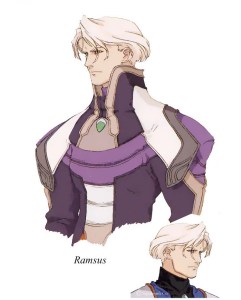Kahran Ramsus
At first glance, Kahran Ramsus has it all. He’s the commander of the Gebler army, the military branch of the Solaris Empire. He has power, respect, and authority. There’s just one problem.
He doesn’t take rejection very well.
The 1998 videogame Xenogears is infamous for the psychological conditions of its characters. Main protagonist Fei Fong Wong suffers from Dissociative Identity Disorder (multiple personalities). Ramsus harbors an inferiority complex: one that brings great tragedy to his story.
Ramsus’ inferiority issues stem from the failure of his own invulnerably-assumed strength. Ramsus was present at the destruction of Elru (a colony made famous for its red-haired destroyer). Witnessing firsthand how the later-titled Demon of Elru destroys Gears (the game’s giant robots) singlehandedly, Ramsus watches helplessly as the Demon routs his forces. Then he suffers a serious blow once the Demon summons his Gear and annihilates Elru. This is the first crack in Ramsus’ sanity. He sees his survival as a record of his failure, something that haunts him despite the confident persona he’s created for himself.
However, Ramsus’ fears of Elru are quickly overshadowed by his rivalry with Fei. While Fei’s fighting style (similar to the Demon’s) is the first nail in Ramsus’ psychological coffin, Fei’s name triggers a deeper resonance within Ramsus. From that point onward, Ramsus is obsessed with Fei. Just the mere mention of Fei’s name makes him rabid. He continually disobeys orders to go after Fei. Nothing else counts. It doesn’t matter if he was the pride of the prestigious Jugend academy. It doesn’t matter if he was an Element, the cream of the Jugend crop. All that matters to Ramsus is that Fei exists. As long as Fei’s around, Ramsus cannot be whole.
It’s towards the game’s end that Ramsus’ obsession comes to light. He is an artificial being. Officially he was created to be the clone of Emperor Cain, Solaris’ ancient ruler. Unofficially, he was meant to be an artificial Contact (a being who can make contact with God and receive his power). On the eve of his conception, Fei is discovered to be the true Contact. Thus, Ramsus no longer has use, and is discarded. It’s a slight that Ramsus never forgets.
The Xenogears characters have mental conditions that revolve around real-life concepts. Ramsus’ psychological condition is an echo of self-actualization, a theory of need fulfillment put forth by psychologist Abraham Maslow. Maslow’s theory constitutes a set of conditions that must be met for a person to become the best version of him/herself. Unfortunately for Ramsus, the person standing in the way of self-actualization is Fei. In order to complete himself, he must eliminate Fei.
Ramsus is the typical rags-to-riches character. He fought from the gutters of his birth and attained the highest honors of his society. Yet his rejection sowed seeds of helplessness, seeds that bloomed in the form of Fei’s existence. His spiraling tale of destruction is sad, but richly intricate for a videogame character.








